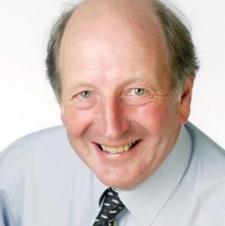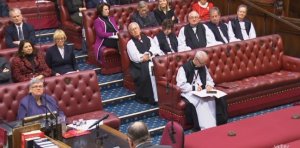Twenty-six Anglican bishops are given seats as of right in the House of Lords.
The UK is the only western democracy which reserves seats for clerics in its legislature.
This is unfair, undemocratic and undesirable. It's time to abolish the bishops' bench.
Two archbishops and 24 bishops of the Church of England currently have automatic seats in the House of Lords. They are sometimes known as 'the lords spiritual'.
We campaign for a secular upper house with no specific religious representation, whether of Christian denominations or any other faiths. In a secular state no religion or its leaders should have a privileged role in the legislature.
Any serious proposals to reform the House of Lords must address the unjustified privilege of the bishops' bench.
62% of Brits think no religious clerics should have an automatic right to seats in the House of Lords.
After over a century of decline in religious attendance in Britain, the claim that bishops — or any other religious representatives — speak for any significant constituency is not warranted. Less than 1% of the British population now attend Anglican services on the average Sunday.
In addition, the presence of religious leaders amounts to double representation of religious interests as many peers already identify themselves as being religiously motivated. Retired religious leaders are often appointed as peers.
Bishops do not have any "special moral insight" unavailable to everybody else. The idea that bishops or any other 'religious leaders' have any monopoly on issues of morality is offensive to many non-religious citizens. Those who profess no religion are no less capable of making moral and ethical judgements.
In an increasingly secular society the role of religious representatives in our legislature has become irrelevant, and has stood in the way of progressive legislation.
Take action!
1. Write to your MP
Ask your MP to help end the archaic, unfair and undemocratic bishops’ bench in the House of Lords.
2. Share your story
Tell us why you support this campaign, and how you are personally affected by the issue. You can also let us know if you would like assistance with a particular issue.
3. Join the National Secular Society
Become a member of the National Secular Society today! Together, we can separate religion and state for greater freedom and fairness.
Latest updates
Labour peer raises case for disestablishment in Lords
Posted: Wed, 28 Nov 2018 16:41
The National Secular Society has reiterated its call for the disestablishment of the Church of England after a peer raised the subject in the House of Lords.
Labour lord Tony Berkeley asked government peer George Young what case there was for disestablishment. Young replied: "None."
Berkeley highlighted NSS reporting from earlier this year which showed the proportion of British people affiliating to the Church of England had halved since 2002.
Crossbench peer Alex Carlile asked Young to reflect on the fact there had been no established church in Wales since the Welsh Church Act 1914.
The church was also accused of being "the Tory party at prayer".
But Young defended the automatic right of the Church of England's 26 bishops to sit in the Lords, saying they "speak with a moral authority that escapes most of us".
Meanwhile the bishop of Worcester, John Inge, and peers from the Labour and Conservative parties defended the church's establishment.
Inge claimed the Church of England's "established status" was "greatly valued by those of other faiths" and said the established church was "a significant force for good".
He was given priority as he stood up to speak, in line with Lords protocol which effectively requires members to sit down when a bishop asks to contribute to the debate. NSS honorary associates Dick Taverne and Michael Cashman were among those who tried to speak during the debate but were unable to do so.
Conservative peers Alistair Cooke (Baron Lexden) and James Mackay were among those to defend establishment. Labour's Robert Winston said the church made him "proud to be British".
NSS chief executive Stephen Evans said the Lords debate suggested "the prevailing attitude among lords is out of touch with that of the public".
"In the House of Lords today Lord Young handled the subject of disestablishment with contempt.
"The UK is long overdue the formal separation of church and state. A secular country would value all citizens equally regardless of their religious orientation or lack of it. The status quo privileges one part of the population, one institution and one set of beliefs.
"It also promotes, without democratic mandate, the contentious view that the Church of England is a force for good. This view has allowed the church – and religious institutions more generally – a free pass in instances where they have caused harm."
Over the last year a series of surveys have suggested substantial public support for separating church and state. A YouGov poll for The Times found that 62% of British people thought religious clerics should have no right to seats in the legislature. In the same poll 65% said political figures should separate their religious beliefs from their decision making.
Fifty-two per cent of people told this year's British Social Attitudes Survey they have no religion. Just 14% belong to the Church of England, including only two per cent of young adults.
The NSS has campaigned for the disestablishment of the church since its founding in 1866. In December 2017 the society outlined the case for change in a major report, Separating Church And State: The Case for Disestablishment. The report noted that the accession of Prince Charles to the throne would be a "particularly opportune moment" to press the benefits of separating church and state.
Bishops’ place in Lords must be reviewed, say MPs
Posted: Mon, 19 Nov 2018 17:08
A committee of MPs has said proposals to cut the size of the House of Lords should prompt a reduction in the number of bishops who sit there by right.
A report by the public administration and constitutional affairs committee (PACAC), published on Monday, has echoed concerns about proposed Lords reform which the National Secular Society raised in 2017.
The report said a reduction in the size of the Lords would only be a "temporary expedient" if the numbers of bishops and hereditary peers were not also reduced.
The report was a response to a report published last year by the lord speaker's committee on the size of the house (also known as the Burns committee). The Burns committee's report recommended a series of steps to reduce the size of the Lords without using legislation.
At the time the NSS pointed out that this would increase the voting power of the Lords spiritual, whose position can only be changed through primary legislation. The Lords spiritual are 26 Church of England bishops who assume their places in the house automatically.
PACAC's report welcomed the idea of reducing the size of the Lords but said doing so would "not remove the pressure" for legislative reform.
"While we recommend the non-legislative proposals set out in the Burns report as an achievable next step for addressing the problem of the size of the house, the task of reforming the second chamber of the UK parliament must not be put on hold until the issue of the size of the House of Lords is 'solved'.
"This small incremental reform should not halt the pursuit of more radical reform to the second chamber."
The Burns recommendations would reduce the number of appointed and hereditary members of the Lords to 574, meaning there would be 600 peers in total. PACAC said this would mean almost 20% of the Lords would be bishops or hereditary peers. It warned that such a situation would "not be representative of the diversity of the modern United Kingdom".
PACAC said Lord Burns, who chaired the committee bearing his own name, had told its hearings it was "quite important not to get involved" with the issue of the bishops. He said the issues were "extremely difficult and would simply lead to the postponement of any plans".
NSS chief executive Stephen Evans welcomed PACAC's report and said any proposals for Lords reform "must consider the fact Church of England bishops sit in the UK legislature as of right".
"Reducing the size of the Lords without legislation would be a cop-out. It's heartening to see this committee echoing our concerns that it would increase the bishops' unjustifiable voting power.
"The bishops' automatic right to sit in the Lords privileges Anglicanism and helps to reinforce the harmful myth that the C of E provides the UK's moral leadership.
"It is a privilege which sits uneasily in the 21st century and is contrary to the aspiration for a more representative and equitable parliament, which makes laws to benefit all of the UK's citizens. It is a privilege that should be revoked sooner rather than later."
The NSS campaigns for the removal of bishops' automatic right to sit in the Lords.
After the NSS criticised his committee's recommendations last year Lord Burns said the committee favoured a reduction but the issue should be tackled "at a later point". He said mentioning it in his report would have been "a distraction".
In response the NSS said he had failed to explain his reasoning, adding that a debate on the bishops' place in the Lords was "long overdue".
In September the government's faith minister called for representatives of other religions to be given seats as of right in the House of Lords. The NSS criticised the proposal.
In response to the latest report Mr Evans reiterated the NSS's view that the practice of giving clerics automatic seats in the legislature should be abolished entirely.
"The state should treat all citizens equally as individuals rather than as members of faith communities to be spoken for, often by unrepresentative 'community leaders'."




